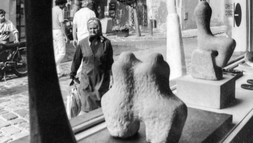Leuphana Arts Program
The work of artists is based on forms of querying, of searching and exploring, which are comparable to scientific research, even if they don't subscribe to the same expectations about objectivity and truth. Artistic research is aimed at strategically broadening and deepening knowledge that is not ancillary to an individual project, but that forms an integral part of an artistic practice. In dialogue with scientific partners, artistic research can spark important innovative impulses for the sciences by systematically questioning their thematic, methodological and epistemological preconceptions.
The LAP wants to prove that a succcessful cooperation between the arts and the sciences need not be merely incidental, but that it can work sustainably. The program provides a framework for the mutual stimulation and support of artistic and scientific forms of thinking and working and will develop the required institutional, organisational and communicative models.
The Leuphana Arts Program serves to integrate art into the university as a practice, as a form of knowledge and a form of discourse. Art is regarded as a 'machine' for the production of difference and innovation. The LAP seeks to create friction and energy between the different areas of artistic, scientific and social practice.
Art has always been based on media. The digital media have broadened the aesthetics and the context of the arts, as well as radically changing the forms of social communication and production at large. "Digital culture" represents a new cultural paradigm which touches and transforms all of these areas.
The Leuphana Arts Program focuses on the development of artistic projects. It supports them in the interdisciplinary environment of the university. The impulses for the evolving interdisciplinary dialogues come from the artists who are regarded not as mere 'innovative disruptors', but as researchers and developers in their own right.
The LAP is a laboratory, a site for people working in the crossover zones of artistic production. Its work is oriented towards open processes rather than towards finished products.


![[Translate to Englisch:] Kunstraump2p_Disborderly_Sudabe Yunesi](/fileadmin/_processed_/3/3/csm_nothingisyourfault_e6d702dd70.jpg)
